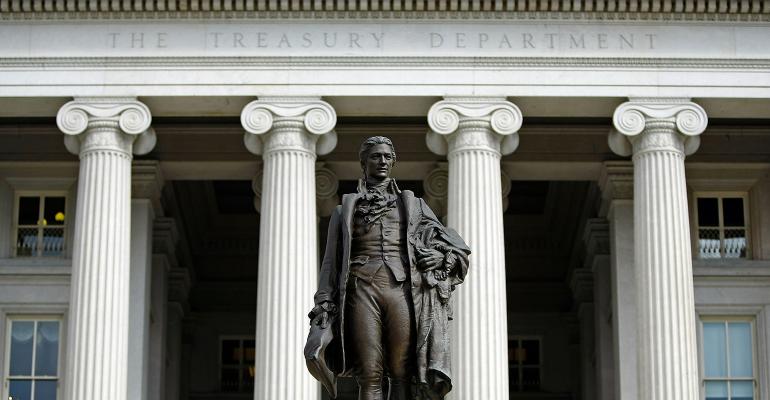By Michelle Price and Pete Schroeder
WASHINGTON (Reuters) - The U.S. Treasury on Thursday rejected the idea of singling out specific asset management and insurance firms as systemically risky, indicating that they are unlikely to be designated as “too big to fail” and slapped with additional oversight under the administration of President Donald Trump.
The report will be cheered by the likes of BlackRock BLK.N, Vanguard, Fidelity FGL. and Pimco, which have pushed back on attempts by regulators to impose bank-like “systemically risky” labels on asset managers simply because they hold trillions of dollars in assets under management.
The Treasury’s 176-page report shines a spotlight on two massive financial industries that have attracted less political and regulatory scrutiny in the wake of the global financial crisis than the banking industry. In its recommendations, Treasury broadly rejected the idea those companies should be regulated like banks.
It also encouraged regulators, both domestic and international, to streamline rules across both industries and to encourage consumer access to products and services.
“We are recommending more efficient and effective regulation to give consumers access to the products they need while providing individuals with opportunities to save for retirement,” Treasury Secretary Steven Mnuchin said in a statement.
The report is the third of four expected from Treasury as it completes a comprehensive review of existing financial rules, as mandated by an executive order from President Donald Trump in February. The previous two reports focused on banks and capital markets.
The Treasury does not directly oversee asset managers or insurers, which are regulated by the Securities and Exchange Commission (SEC) and at a state level respectively, but the report is likely to influence regulators’ approach to the industries.
Designation Fight
In the wake of the global financial crisis, regulators drew up a list of big banks and insurers that posed a risk to the broader financial system and subjected them to greater scrutiny. The development sparked a fierce debate over whether asset managers such as BlackRock should be added to the list.
The Financial Stability Oversight Council, charged with monitoring systemic risks, opted in 2014 not to designate asset managers as systemically risky following fierce pushback from large firms.
On Thursday, the Treasury said the company-focused designation approach is not suited to the asset management and insurance industries, arguing instead that regulators should focus on risky activities.
Its finding effectively shuts the door on the U.S. asset management debate and should boost insurers’ efforts to shake off the label.
Currently, Prudential FinancialPRU.N is the only insurance company designated as “systemically significant” after the council voted in September to remove that label from American International GroupAIG.N.
MetLifeMET.N successfully contested its label in court in 2016, and the government’s appeal in that case is on hold awaiting the Treasury’s review. Thursday’s report suggested the government may drop that case.
The Treasury on Thursday also pushed back on international efforts to more closely scrutinize asset managers. It called for the Financial Stability Board - the global body comprised of central banks that had pushed for managers to be deemed systemically risky - to stop describing asset management as “shadow banking,” which could suggest the sector is lacking in oversight.
While Treasury seemed to endorse SEC rules introduced following the crisis to mitigate liquidity crunches in the fund management industry, it rejected further measures including the idea that managers should be subject to “stress tests” similar to banks.
In a recommendation that could spark a minor shake-up in the SEC’s investment management division, the Treasury recommended the SEC move to a single streamlined process for approving exchange-traded-funds.
The Treasury also recommended the Labor Department continue to delay its “fiduciary rule” that sets higher standards for investment advisers. That rule, finalized under President Barack Obama, has been put on hold by the Trump administration and is being revised after industry pushback.
Reporting by Michelle Price and Pete Schroeder; additional reporting Trevor Hunnicutt and Ross Kerber; editing by Dan Grebler and Cynthia Osterman






